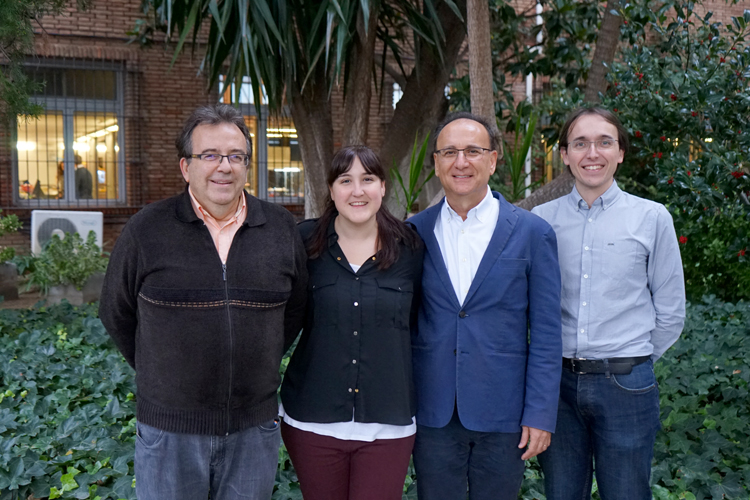La Dra. Elisabeth Bou ha defendido su tesis doctoral sobre nuevos inhibidores de las quinasas MNKs para el tratamiento del cáncer de mama triple negativo, en combinación con otras terapias convencionales. La investigación de la Dra. Bou ha contemplado desde el diseño de nuevas estructuras, mediante estudios computacionales, hasta la síntesis y la evaluación biológica de las mismas.

Dr Jose Ignacio Borrell, Dr Elisabeth Bou, Dr Santiago Ramon y Cajal and Dr Roger Estrada
Conventional cancer treatments are based on chemotherapy sessions, a very aggressive therapy that indiscriminately destroys all types of cells, both cancerous and healthy. In the case of breast cancer, one of the best controlled with the highest recovery rates, there is one very aggressive type of cancer, triple negative, which has worse results for patients as it does not respond to regular treatments.
A common characteristic of all types of cancer is the deregulation of protein synthesis and uncontrolled cellular replication. A key factor in controlling the translation of proteins is translation initiation factor 4E (eIF4E), which is regulated by the MNK1/2 kinases (MAP kinase interacting kinases 1 and 2) through phosphorylation.
eIF4E, a protein which is in charge of initiating the synthesis of the other proteins responsible for growth and cellular proliferation, has been described in recent years as an independent prognosis factor associated with malignant cellular progression and the development of resistance. This protein is found abundantly in patients with different types of cancer, such as ovarian, breast, lung, bladder, and prostate cancer.
The phosphorylation of eIF4E is necessary for tumour transformation but it is not essential for the development of normal cells. Therefore, the pharmacological inhibition of MNKs, which regulate the eIF4E activity, can provide a non-toxic and effective alternative strategy to treat cancer, especially combined with approved treatments.
As part of the research that the Pharmaceutical Chemistry Group (GQF) at IQS conducts, Dr Elisabeth Bou did her doctoral thesis about this new therapeutic strategy. The thesis, which has opened a new pathway to obtain new MNK inhibitors, was directed by Dr José Ignacio Borrell, professor of the IQS School of Engineering and coordinator of the GQF, together with Dr Roger Estrada Tejedor, the professor responsible for the IQS Molecular Design Laboratory, and Dr Santiago Ramón y Cajal Agüeras, Director of the Translational Molecular Pathology Unitof the Vall d’Hebron Research Institute (VHIR) as codirectors.
In this research, based on the computational studies of possible structures, researchers have proposed pyrazole[3,4-b]piridine systems as possible candidates for MNK inhibitors, due to their similarity with known inhibitors; the synthetic possibilities offered by these structures have been studied, defining general methodologies to introduce selective and controlled replacements at six different points of the molecule. Additionally, their reaction mechanisms have been evaluated and described; and five families of compounds based on pyrazole[3,4-b]pyridines have been studied, with one of the families displaying interesting activity in preliminary trials.
Finally, making use of new molecular modelling techniques, the researchers have studied, in the case of the best candidate selected, its mechanism of action on the protein, given that understanding the mechanism of action in drugs is essential to correctly design the strategy of combining them with chemotherapy.
In short, the proposal to include MNK kinase inhibitors in triple-negative breast cancer treatments, as a complement to traditional therapies, would shorten the expected treatment times with chemotherapy, also with an expected decrease in the drug doses to be administered to patients.
This project has been cofinanced by the European Social Fund.











